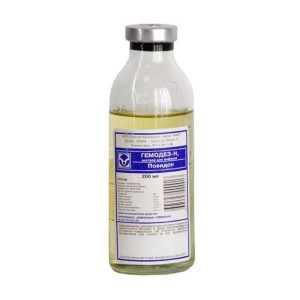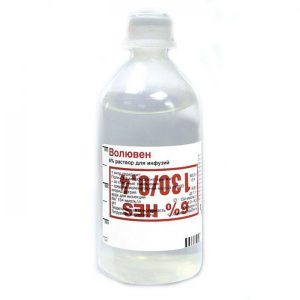Description
Latin name
Voluven
Packaging
500 ml – plastic bottles with a loop-holder for a dropper (10) – cardboard boxes.
Pharmacological action
Plasma replacement drug.
Voluven is a solution of hydroxyethylated starch (HES), which is obtainedthey are made from amylopectin of waxy maize and are characterized by molecular weight and degree of substitution. For Voluven, the average molecular weight is 130,000 Da, and the degree of substitution is 0.4, which means that there are 4 hydroxyethyl groups per 10 glucose residues of amylopectin. HES is structurally related to glycogen, which explains its high tolerance and low risk of anaphylactic reactions. Voluven is characterized by high stability of the solution and does not give flocculation with temperature fluctuations.
Voluven is an isooncotic plasma-substituting solution, so when it is injected, the volume of intravascular fluid increases in proportion to the volume entered Voluven.
The persistent volemic effect of Voluven is 100% within 4 hours from the moment the drug is introduced into the vascular bed. The therapeutic effect lasts up to 6 hours.
Pharmacokinetics
The pharmacokinetics of HES is complex and depends on the molecular weight of the HES, the degree of molar substitution of the substance, and the nature of the molar substitution of C2 / C6 by hydroxyl groups.
After iv administration of HES, molecules weighing less than 60,000-70,000 Da (threshold for renal filtration) are rapidly excreted in the urine, and larger molecules are cleaved by β-amylase of blood plasma, after which they are also excreted through the kidneys. The lower the degree of HES substitution, the faster the drug is hydrolyzed by β-amylase and excreted from the body, the less accumulation in tissues (in particular, in the cells of the immune system) and blood plasma. The nature of substitution C2 / C6 affects the volemic effect of the drug. This indicator at Voluven is 9: 1, i.e. hydroxyl groups are located in a more stable position C2 9 times more than in C6. If in position C2 is Since 8 hydroxyl groups, the HES volemic effect is more stable than HES with this indicator less than 8.
The average molecular weight of Voluven in vivo in the first minutes after infusion is in the blood plasma 70,000-80,000 Yes and remains above the renal filtration threshold for the entire treatment period.
After administration of 500 ml of Voluven, its clearance in blood plasma is 31.4 ml / min. After a single injection of 500 ml of T1 / 2 drug in blood plasma in the first phase of excretion is 1.4 hours, and in the second phase – 12.1 hours.
With a single administration of 500 ml of Voluven, HES molecules are completely excreted after 24 hours. With repeated administration of 500 ml HES 130 / 0.4 solution for 10 days, a significant accumulation of the substance in the blood plasma was not detected.
Pharmacokinetics in special clinical cases
In patients with stable impaired renal function (mild to severe) and CC <50 ml / min, Cmax HES in the blood was slightly higher than in patients with CC> 50 ml / min at the same the administered dose of the drug (500 ml). Impaired renal function did not affect T1 / 2 in the final elimination phase and CmaxHEC in plasma. With KK> 30 ml / min, 59% of the administered dose of the drug was excreted in the urine, and with KK 15-30 ml / min – 51%.
Compared with HES 200 / 0.5, Voluven has improved pharmacokinetics (optimized metabolism and excretion), while maintaining its plasma-replacing effect. Moreover, the drug has maximum safety compared to previous generations of HES, because has a minimal effect on the hemostatic system, even with repeated administration of high doses, as well as its accumulation in tissues is practically absent.
Indications
treatment and prevention of hypovolemia of any genesis and shock (due to injuries, including spinal injury with damage to the spinal cord, blood loss, burns, sepsis, multiple organ failure, in the postoperative period, acute adrenal insufficiency, anaphylaxis and other conditions accompanied by the development of collapse)
acute normovolemic hemodilution
therapeutic hemodilution
filling of the extracorporeal circulation apparatus.
Contraindications
hyperhydration
hypervolemia
congestive heart failure
severe bleeding disorders
intracranial bleeding
state of dehydration, when correction of water-electrolyte balance is more severe,
hypernatremia
hypersensitivity to the drug.
Use in cases of impaired liver function
Special care is required for severe liver failure.
Use in case of impaired renal function
The drug is contraindicated for use in severe renal failure with oliguria or anuria and in patients hemodialysis
Use in children
Children under the age of 2 years who underwent surgical interventions (excluding cardiological), tolerance during the use of Voluven during operations was comparable to the tolerance of 5% albumin.
Pregnancy and lactation
There are no clinical data on the use of the drug Voluven during pregnancy and lactation.
The use of the drug during pregnancy is possible only if the potential benefit to the mother outweighs the potential risk to the fetus.
In experimental animal studies, no direct or indirect adverse effects on pregnancy, the development of the embryo / fetus, childbirth and postnatal development were revealed. Signs of teratogenicity were not observed.
Composition of
1000 ml of solution contain:
Active ingredients: poly (O-2-hydroxyethyl) starch 60 g sodium chloride 9 g
Excipients: sodium hydroxide – qs for pH correction, hydrochloric acid – qs for pH adjustment, water d / and – up to 1 liter.
Dosage and administration
The drug is administered by prolonged iv infusion.
The first 10-20 ml of the solution should be administered slowly, with careful monitoring of the patient’s condition, due to the risk of anaphylactoid reactions.
The daily dose and rate of infusion depend on the degree of blood loss, maintenance or restoration of hemodynamics, and the degree of hemodilution (blood dilution).
In situations requiring quick compensation of hypovolemia and emergency replenishment of bcc, you can use 500 ml of the solution in plastic containers under pressure. In this case, before the introduction of Voluven, it is necessary to remove air from the container in order to prevent the occurrence of air embolism.
The maximum daily dose is 50 ml / kg body weight / day, which corresponds to 3750 ml / day with a patient body weight of 75 kg.
In children under the age of 2 years who underwent surgical interventions (excluding cardiological), tolerance during the application of Voluven during operations was comparable to the tolerance of 5% albumin.
To supplement the BCC in adults, the maximum dose is 50 ml / kg / day in children and adolescents aged 10-18 years old – 33 ml / kg / day in children aged 2-10 years – 25 ml / kg / day in newborns and children under the age of 2 years – 25 ml / kg / day.
Voluven can be administered repeatedly over several days, depending on the clinical situation. The duration of treatment depends on the duration and severity of hypovolemia, on the hemodynamic efficacy of the drug and on hemodilution.
Side effects
Dermatological reactions: with prolonged administration in high doses – skin itching.
On the part of laboratory parameters: an increase in serum amylase concentration is possible. When using the drug in high doses, due to the dilution effect, it is possible to dilute blood components, reduce hematocrit, as well as coagulation factors and plasma proteins. In this regard, during the infusion, the activity of coagulation factor VIII (von Willebrand) can be reduced. Bleeding times and other indicators of blood coagulation may increase. However, these changes are significantly reduced compared to those with infusion of HES of previous generations, and are restored to their original level 6 hours after the cessation of drug infusion.
Other: allergic reactions of varying severity.
Drug Interaction
Mixing Voluvian with other drugs should be avoided. If this is required in exceptional cases, then the compatibility of the medicinal products (opacification, precipitation) should be checked, the aseptic rules should be observed when mixing, and good mixing should be ensured.
Overdose
Symptoms: congestion of the circulatory system (eg, pulmonary edema).
Treatment: discontinuation of the drug, if necessary, appoint a diuretic.
Storage conditions
The drug should be stored out of the reach of children, in a dry, dark place at a temperature not exceeding 25 ° C. Do not freeze
Use only clear solutions in undamaged packaging. After opening the vial or container, the solution should be used immediately. Unused solution must be destroyed.
Expiration
In containers freeze – 3 years
In bottles – 5 years.
active ingredient
hydroxyethyl starch
Conditions of supply of pharmacies
prescription
Fresenius Kabi, Germany



